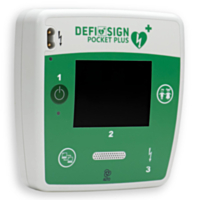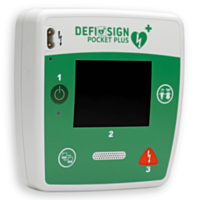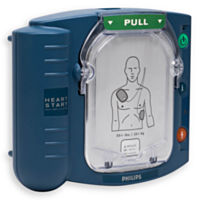Defibrillators for on the road
Emergencies can happen everywhere in the most unexpected moments, even when you are on the road. In the case of a cardiac arrest while on the road, an Automated External Defibrillator is the most valuable device you can have with you.
Below you can find the most suitable defibrillators for on-the-go situations. Portable defibrillators, your heart's guardian anytime, anywhere!
-
 + Free wall CabinetDefiSign Pocket Plus Defibrillator Fully-AutomaticManufacturer : SchillerSemi or full automatic : Fully AutomaticQuality label : CEThe DefiSign Pocket Plus Defibrillator Fully Automatic is a compact and versatile defibrillator that offers a range of useful features. Its small size makes it incredibly convenient to transport, especially when using the included bag. The defibrillator is designed to cater to users of all skill levels, making it suitable for various situations, including sport clubs, festivals, ambulance transport, and as part of FAFS-equipment. The LCD screen of the defibrillator has an automatic light adjustment feature, ensuring optimal visibility in any environment. This screen displays clear visual instructions to guide users through the resuscitation process. For professional rescuers, there is an optional ECG-display available, which provides additional insight into the heart rhythm during and after the resuscitation process. This feature makes the defibrillator particularly well-suited for use by skilled rescuers. Manufacturer: Schiller Fully automatic Child-button Compact ECG display option Included bag Visual guidance on large LCD screen The DefiSign Pocket Plus AED Fully Automatic is also available in a semi-automatic version.£2,149.00 £2,578.80In stock, available immediately
+ Free wall CabinetDefiSign Pocket Plus Defibrillator Fully-AutomaticManufacturer : SchillerSemi or full automatic : Fully AutomaticQuality label : CEThe DefiSign Pocket Plus Defibrillator Fully Automatic is a compact and versatile defibrillator that offers a range of useful features. Its small size makes it incredibly convenient to transport, especially when using the included bag. The defibrillator is designed to cater to users of all skill levels, making it suitable for various situations, including sport clubs, festivals, ambulance transport, and as part of FAFS-equipment. The LCD screen of the defibrillator has an automatic light adjustment feature, ensuring optimal visibility in any environment. This screen displays clear visual instructions to guide users through the resuscitation process. For professional rescuers, there is an optional ECG-display available, which provides additional insight into the heart rhythm during and after the resuscitation process. This feature makes the defibrillator particularly well-suited for use by skilled rescuers. Manufacturer: Schiller Fully automatic Child-button Compact ECG display option Included bag Visual guidance on large LCD screen The DefiSign Pocket Plus AED Fully Automatic is also available in a semi-automatic version.£2,149.00 £2,578.80In stock, available immediately -
 + Free wall CabinetDefiSign Pocket Plus Defibrillator Semi-AutomaticManufacturer : SchillerSemi or full automatic : Semi AutomaticQuality label : CEThe DefiSign Pocket Plus Defibrillator Semi-Automatic is a compact and versatile defibrillator that offers a range of useful features. Its small size makes it incredibly convenient to transport, especially when using the included bag. The defibrillator is designed to cater to users of all skill levels, making it suitable for various situations, including sport clubs, festivals, ambulance transport, and as part of FAFS-equipment. The LCD screen of the defibrillator has an automatic light adjustment feature, ensuring optimal visibility in any environment. This screen displays clear visual instructions to guide users through the resuscitation process. For professional rescuers, there is an optional ECG-display available, which provides additional insight into the heart rhythm during and after the resuscitation process. This feature makes the defibrillator particularly well-suited for use by skilled rescuers. Manufacturer: Schiller Semi-automatic ✔️Child-button ✔️Compact ✔️ECG-display option ✔️Included bag ✔️Visual guidance on large LCD display The DefiSign Pocket Plus defibrillator is also available as a fully automatic version.£2,149.00 £2,578.80In stock, available immediately
+ Free wall CabinetDefiSign Pocket Plus Defibrillator Semi-AutomaticManufacturer : SchillerSemi or full automatic : Semi AutomaticQuality label : CEThe DefiSign Pocket Plus Defibrillator Semi-Automatic is a compact and versatile defibrillator that offers a range of useful features. Its small size makes it incredibly convenient to transport, especially when using the included bag. The defibrillator is designed to cater to users of all skill levels, making it suitable for various situations, including sport clubs, festivals, ambulance transport, and as part of FAFS-equipment. The LCD screen of the defibrillator has an automatic light adjustment feature, ensuring optimal visibility in any environment. This screen displays clear visual instructions to guide users through the resuscitation process. For professional rescuers, there is an optional ECG-display available, which provides additional insight into the heart rhythm during and after the resuscitation process. This feature makes the defibrillator particularly well-suited for use by skilled rescuers. Manufacturer: Schiller Semi-automatic ✔️Child-button ✔️Compact ✔️ECG-display option ✔️Included bag ✔️Visual guidance on large LCD display The DefiSign Pocket Plus defibrillator is also available as a fully automatic version.£2,149.00 £2,578.80In stock, available immediately -
 + Free wall CabinetPhilips Heartstart HS1 DefibrillatorManufacturer : PhilipsSemi or full automatic : Semi AutomaticQuality label : CE, FDAEasy to use Gives both AED ancd CPR guidance 8-year manufacturer warranty SMART Biphasic Technology to issue a gentler shock to the heart SMART ECG Analysis Technology Self-Test function ensures the defibrillator is always rescue ready See full description below for more information, specifications and details of our service and maintenance contracts. Contact us for advice or a better offer.
+ Free wall CabinetPhilips Heartstart HS1 DefibrillatorManufacturer : PhilipsSemi or full automatic : Semi AutomaticQuality label : CE, FDAEasy to use Gives both AED ancd CPR guidance 8-year manufacturer warranty SMART Biphasic Technology to issue a gentler shock to the heart SMART ECG Analysis Technology Self-Test function ensures the defibrillator is always rescue ready See full description below for more information, specifications and details of our service and maintenance contracts. Contact us for advice or a better offer.
Portable defibrillators for a faster emergency response
One of the greatest advantages of having a defibrillator in the trunk of your car or in your bag, is the ability to respond to a cardiac arrest as quick as possible. With a portable defibrillator at your disposal you can feel safe anywhere you go. Most cases of cardiac arrest occur outside a hospital setting. Research has shown that using an defibrillator within 6 minutes of a cardiac arrest significantly increases the chances of survival. A portable defibrillator ensures that you can provide assistance within the crucial 6 minutes before emergency services arrive.
Suitable defibrillators for on the road
We recommend choosing a compact, lightweight, and easily portable defibrillator to take with you. Opt for an defibrillator that takes up minimal space in your bag, trunk or suitcase. Suitable defibrillators for on-the-go include the DefiSign Pocket Plus and Philips HeartStart HS1.
Things to consider with a portable defibrillator
When you want to take your defibrillator on the road, there are some important points to consider, such as:
- Protect the defibrillator well: Ensure that you store the defibrillator in a sturdy, protective case to prevent damage. Various carrying bags and cases are available to protect the AED during transport.
- Regularly check the battery and electrodes of your defibrillator: A defibrillator operates on batteries, and the electrodes have limited shelf life. Regularly check the battery status of the defibrillator and the expiration date of the electrodes. Replace them if necessary to ensure that the device is always ready for use.
- Storing temperature: it's important to store the defibrillator at the right temperature. If it’s freezing outside it is recommended to store the defibrillator in a warmer place.
Ultimately, purchasing a portable defibrillator is not just acquiring a device; it's an investment in preparedness and the potential to save lives. Whether for personal use, in a community setting, or within an organization, having a portable defibrillator on hand is a proactive measure towards a safer and more secure environment.
Should you have any inquiries regarding portable defibrillators for use on the go, feel free to contact us.